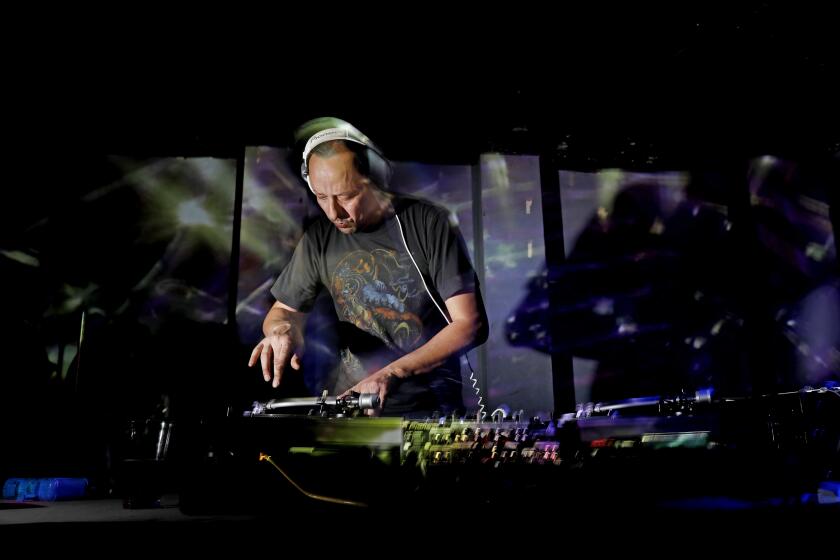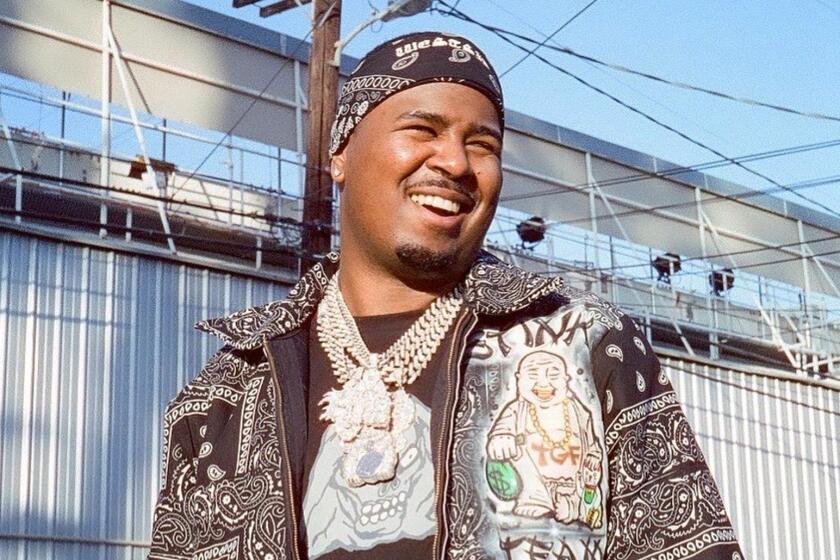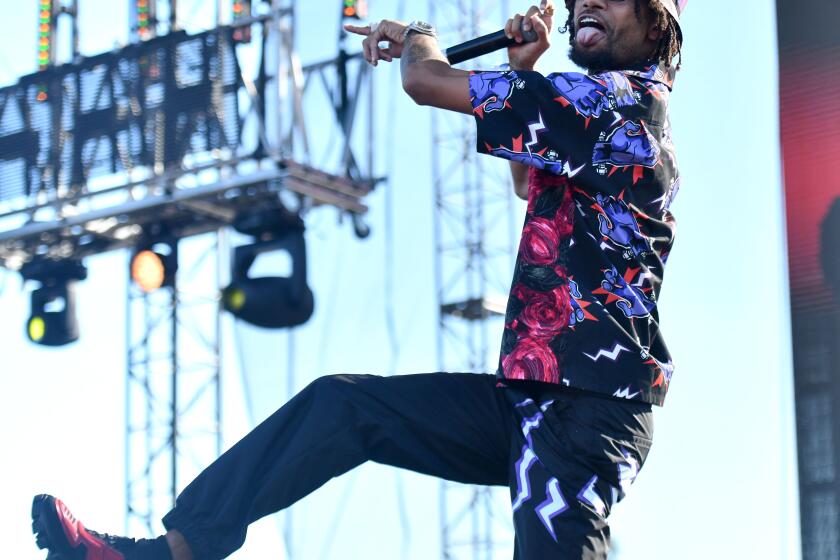The post-jailhouse confessions of Watts rapper 03 Greedo: ‘I don’t believe in anything but art’
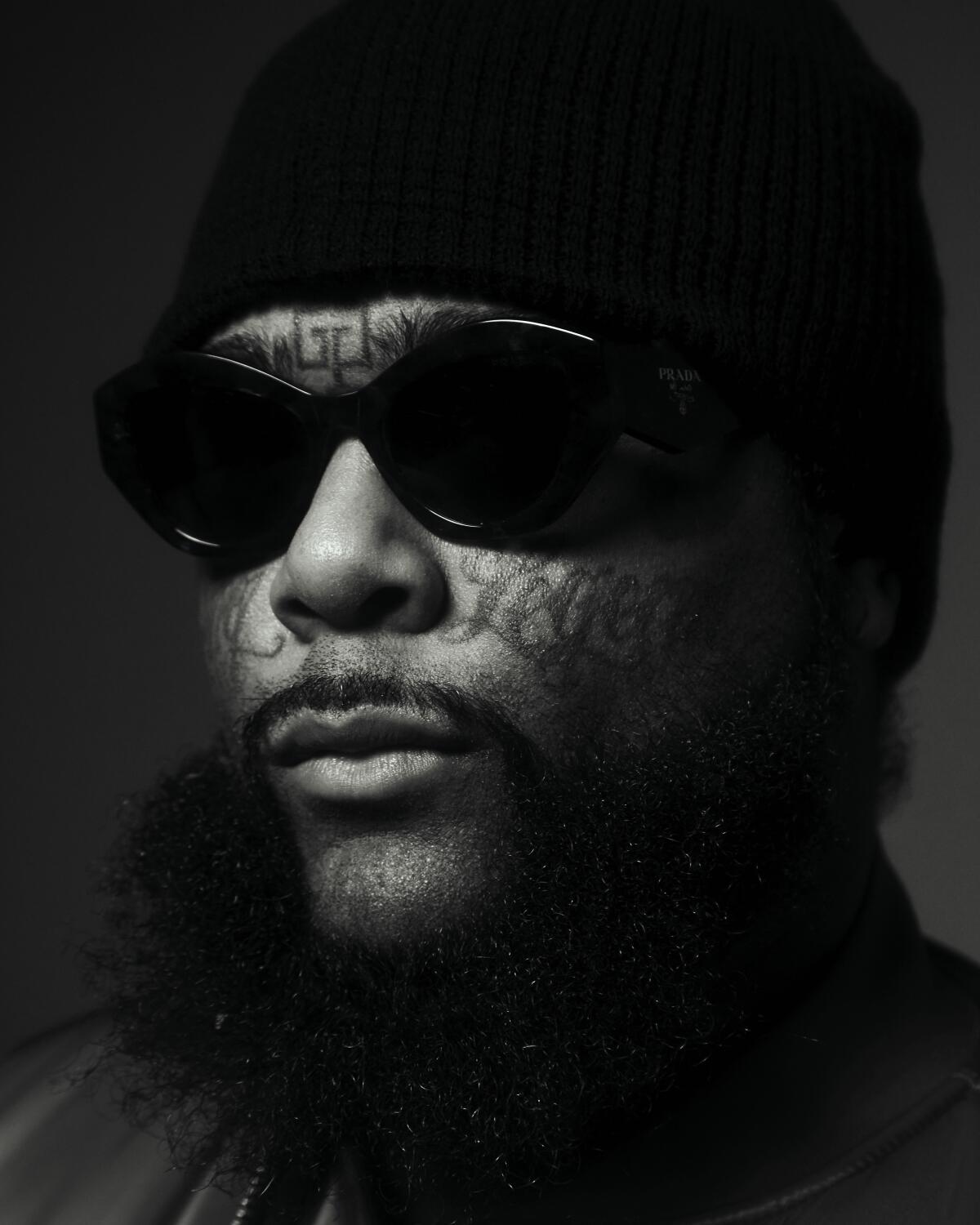
- Share via
DALLAS — The Dallas sky is still half-dark when the black Escalade rolls into the gated community to pick up 03 Greedo. It’s shortly before 8 a.m. on March 16 — the Watts rapper’s first full day as a free man, after nearly a half-decade trapped in the Texas penitentiary system.
A dozen hours from now, Greedo, who once described his sound as “emo music for gangbangers,” will perform at Billboard’s SXSW party in Austin, heralding a messianically awaited return.
“The last time I saw you, we was living,” Greedo, 35, says with a smile, thinking of a different lifetime, throwing a luxury duffel bag into the trunk. It was the summer of 2018, his final week of freedom, a chaotic 12-hour zigzag across L.A that included a shopping spree at the Beverly Center, a recording session at DJ Mustard’s studio and a late-night video shoot. Then he disappeared into the barb-wire labyrinths of Texas prison to serve a 20-year sentence — part of a plea deal for possession of four pounds of methamphetamine and two stolen pistols.
Despite having been a spectral presence for the last five years, Greedo has remained a spiritual life force of West Coast hip-hop — a genre-expanding influence on a younger generation, the chest-cavity splitting soul of the streets, a returning hero for a region haunted by tragedy.
Last year alone, two singles, “Trap House” (featuring Shoreline Mafia) and “Substance,” were certified platinum, even though promotion was impossible from prison. A slowed-down version of the latter became a TikTok sensation in 2021, more than three years after its initial release, eclipsing 200 million Spotify streams.
“I’ve never even seen a TikTok,” Greedo shrugs, a reminder of the cultural shifts that have occurred since he left. “I’m bigger than the industry even knows. They don’t understand because I’m huge in the places that most people don’t go.”
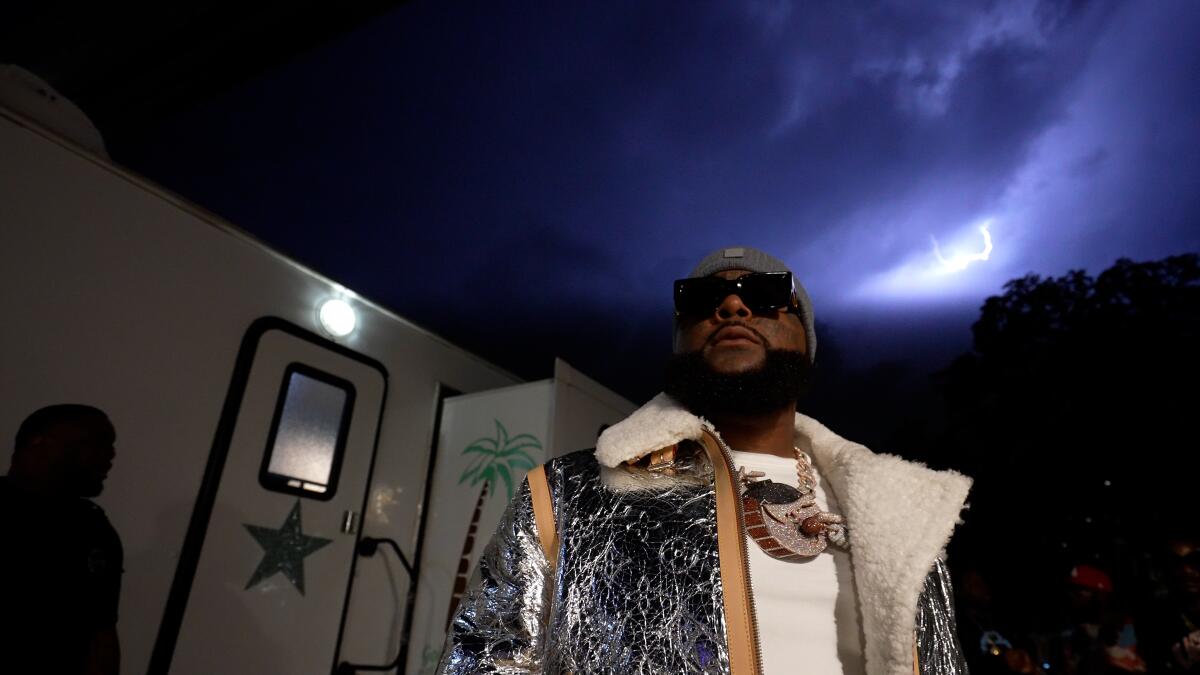
There is something almost ghostly about seeing him in the flesh. An imposing beard sprouts from his face like a holy land mufti. He’s wearing a Louis Vuitton puffer jacket, black Amiri pants and a gray beanie that covers up what were his trademark locs. The “Living Legend” ink on his face has grown fainter, but the phrase seems even more prophetic.
The reentrance to the outside world came suddenly. For the last couple of years, the former resident of Watts’ Jordan Downs projects had retained a parole lawyer to petition for his early release (“the same one as [UGK’s] Pimp C.”) But until his mother broke the news to him during a mid-January phone call, he had no clue about his impending freedom.
“You just sit and wait,” he says. “You only know when you’re up for review. I was expecting the worst. I’d already been denied parole a few times.”
In the month and a half since he left prison in north Texas, Greedo has spent almost every night in a Houston studio. During marathon recording sessions, he recorded 270 songs in 45 days, returning to a nearby halfway house in the bleary, predawn hours. Until yesterday, it remained unclear whether his parole officer would even allow him to leave Houston city limits.
“They’re so disorganized and restrictive in Texas. I don’t even want to speak on it,” he sighs.
For the time being, his probationary terms bar him from leaving the Lone Star State. Hence, the temporary residence in Dallas. There’s another hearing in a month, but as long as he has studio access and the ability to watch his daughter graduate high school in June, everything else seems inconsequential.
“I don’t care about regular life. I don’t believe in anything but art,” Greedo stresses, his eyes masked by opaque designer shades. The SUV begins the 200-mile trek to Austin, past rain-slicked pastures and the infinite sprawl of Whataburgers, gas stations and motels. “If it ain’t fashion or music, I can’t express how much … I don’t care. I don’t care who’s getting married. I don’t care who dies anymore. I’m numb to all that.”
Prison is a topic he’d rather not discuss. Whatever memories exist are actively trying to be expunged.
“I’ve been in jail my entire life,” he says, absorbing the scenery out the window. “None of my enemies are out here in Texas. Jail is fun. Jail is free room and board.”
The hardest deprivation was going without music. For the first two years of the sentence, his only way to listen to anything was to have someone play it over the phone. In the latter half of the bid, he had access to a tablet, but he laments never having heard his last four projects on a proper system — all recorded before he went in but assembled and released from prison.
“There’s something really psychological to how they do it out here,” he admits. “They try to drone you out.”
The Wolf of Grape Street (a nickname derived from the road that runs through Jordan Downs) moves with lupine intensity and swiftness. He’s up early, his words heavy with existential gravity, a Terminator on a mission. If before he was sprawling, admittedly on a “little bit of everything,” now he is sober and focused, like a card-counting pro gambler silently registering every movement. He’s still fearless, but only taking risks after a shrewd calculation. His driver points out a Starbucks for him to stop at, but Greedo tells him that it needs to be a drive-thru.
After all, a brand-new and blinding $200,000 drum chain dangles from his neck, molded after his Drummer Gang crew.
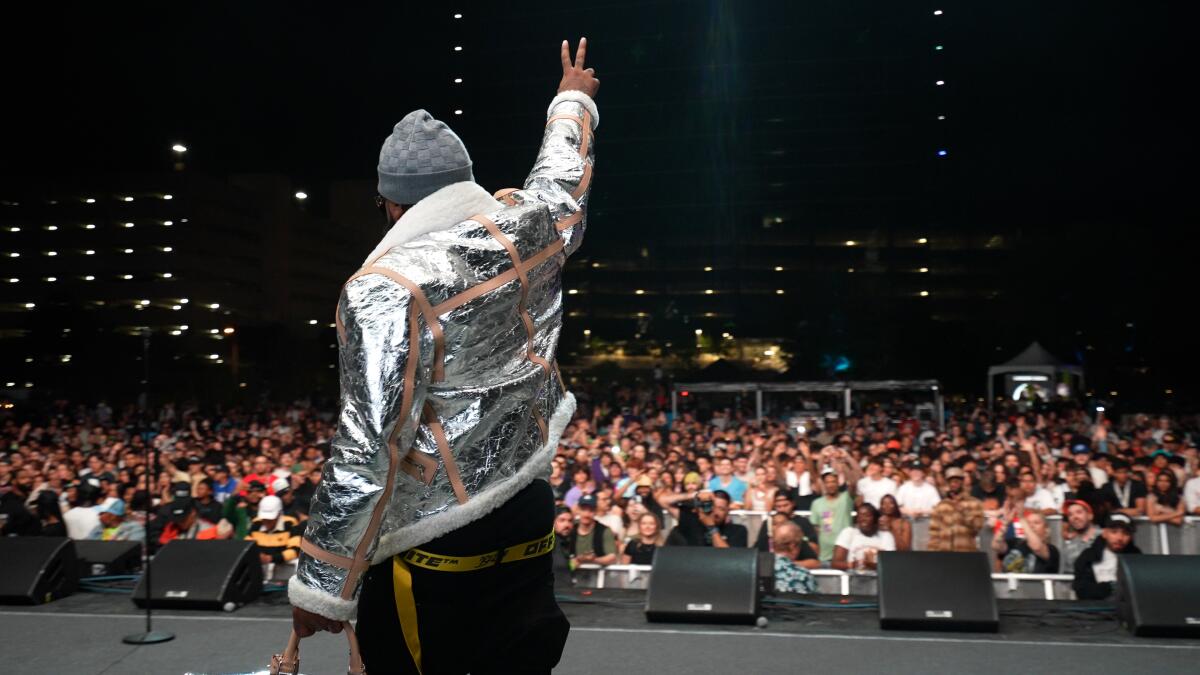
“I went in for 2 kilos and now I got 2 kilos of rose gold and 7,000 diamonds on me,” he laughs, running his fingers over the gems. “Emerald cuts, baguettes, big diamonds in this bitch.”
The caution underscores the nature of being a contemporary rap star. Over the last five years, Greedo has been unable to attend the funerals of several of his closest peers. First, there was Nipsey Hussle, who taught him how to “dance around the industry issues and get around the politics of being a superstar.” Then there was Memphis rapper Young Dolph, an older-brother figure who took Greedo on an early tour. One of Greedo’s first prominent outside features came from PnB Rock, shot outside of a South L.A. Roscoe’s last year, during an attempt to rob him of his jewelry.
Most scarring was the death of his “evil twin,” Drakeo the Ruler, who was stabbed to death in late 2021 at a festival in Los Angeles. Even though they were only simultaneously free for one month in December 2017, they forged a profound musical connection and friendship that made them akin to the 2Pac and Snoop Dogg for their generation — or at least the West Coast’s answer to Gucci Mane and Young Thug.
“I shed tears not just because of losing Drakeo as a friend but also because of what could have been,” Greedo says. “He was my favorite person that I’ve ever recorded with. Our jail calls were hilarious.”
He’s unsure whether it’s because of age or sobriety, but his dreams have grown increasingly vivid.
“I’ll be chilling with Drakeo a lot — not like he’s giving me no message or anything, but we’ll just be going on and living our lives,” Greedo says, his gaze fixed on the gray interstate blur. “But I be trying not to keep talking about Drakeo because I don’t want to start crying.”
The car goes silent. The subject is quickly switched.
“How does it feel to be out?” I ask.
“I’m still not really even out yet. I just passed some s— called Waxahachie,” Greedo says, as the car drives past the small Texas town, whose name is painted on a tall water tower.
“One thing I used to love about drug trafficking is you get to see, ‘Damn, this is what this side of the world looks like, this is what this city looks like,’” Greedo says wistfully. “I remember I was counting down how many of the 50 states I had been to just off of drug trafficking. I got up to like 30, something high. All you gotta do is get in your car and go — even if you not drug trafficking.”
The observation is classic Greedo: unfiltered, nomadic, oddly romantic. His artistry lies partially in his gift to reconcile what wrongly seem like contradictions. He’s spent much of his adult life behind bars but waxes nostalgic about being a teenager in the Jordan Downs projects discovering art films and Takashi Murakami. He can flip a Lana Del Rey sample and Rick James into a filthy sex anthem (“Freak”).
He embodies the aspirations of his section but spent significant time in St. Louis, Sacramento and Atlanta, allowing him to bridge Southern bounce and eccentric auto-tune blues with something hyper-local. His first viral breakout, “Mafia Business,” was a slang-filled requiem performed at the funeral for a Watts OG.
“Greedo can see all the way to the end zone of the football field before the game has even started,” sums up his frequent collaborator, Kenny Beats, who produced “Netflix and Deal,” one of the projects Greedo dropped from prison.
“He’s the representation of true artistic freedom in a place where if you aren’t doing the traditional California sound, you’re not supposed to be able to make your own lane and have this legendary trajectory,” Beats continues. “Greedo’s always been an original, putting his heart on his sleeve, where others are scared to be themselves. Now, he’s come back from insurmountable obstacles and able to tell an extremely important story that a lot of people don’t get to tell.”
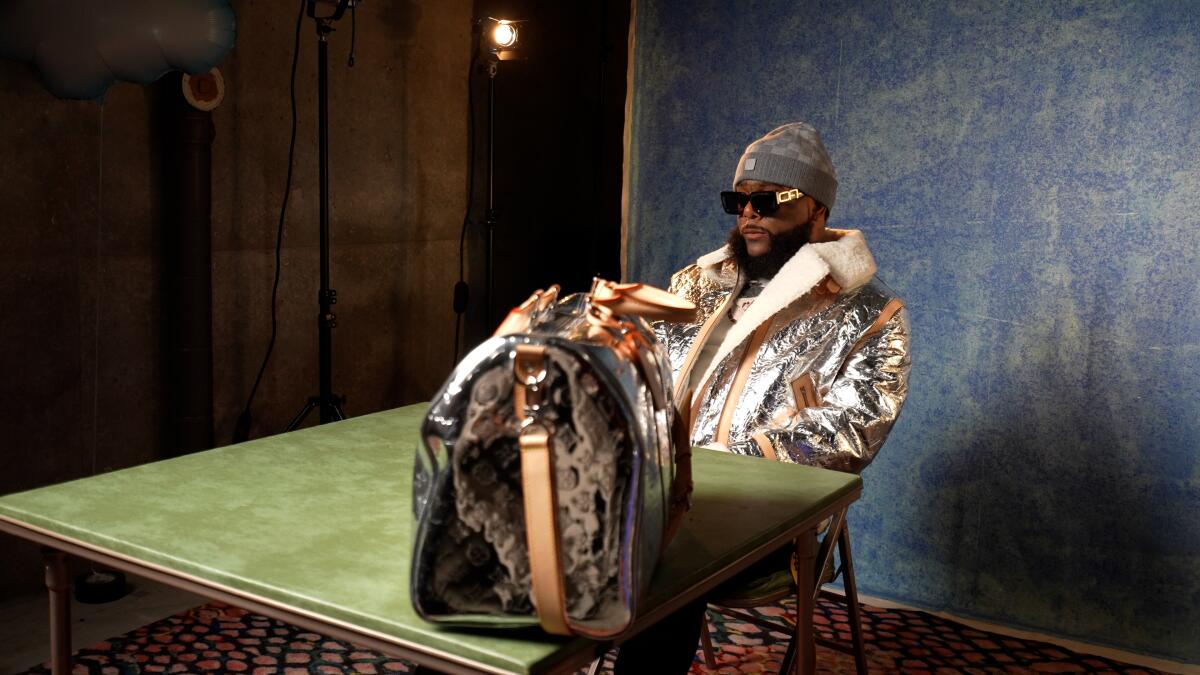
To outsiders, it seemed like Greedo appeared out of nowhere in 2018. But under his previous name Greedy Giddy, he’d spent most of the decade building a grassroots buzz in Watts, Compton and Gardena. But whenever stardom beckoned, the carceral system ensnared him. It changed with 2016’s “Sweet Lady,” a weirdly tender but X-rated Valentine, now approaching 20 million streams on Spotify. For the first time, he was able to stay free long enough to capitalize on the groundswell of attention. And like many of Greedo’s hits, it was a slow burn, taking years to fully seep into the collective unconscious.
“That’s why I call it creep music,” he quips. “Because it creeps up on you.”
His classic trio of “Purple Summer” mixtapes — almost entirely self-produced — made him a California phenomenon, leading to a seven-figure deal with Alamo Records. For the first half of 2018, he was on the short list of hottest rappers alive: collaborating with Lil Uzi Vert, getting played in a Kendall Jenner Instagram story, being acknowledged by Drake as a major inspiration.
Within Los Angeles, Greedo catalyzed a movement. His collaborations with Drakeo and Shoreline Mafia ushered in a new wave that upended conventional expectations of what local hip-hop could look and sound like. Instead of khakis and low-riders, they wore high fashion and crashed expensive foreign cars. Greedo unleashed a trauma-wracked croak over sun-damaged samples, like an alien crash-landing a spaceship atop the Watts Towers, drunk off lean. A song exists for every mood: sexual conquests to solitary-confinement nightmare, drug ballads to disco-ball bacchanalia. Or as he called it, “pain music that’s popping.”
“When we think about Ice Cube saying, ‘I started this gangsta’ s—,’ that’s how Greedo is to this era of L.A. hip-hop. He’s the last pioneer left of this new age,” says Victor “Rosecrans Vic” Ulloa, co-host of Power 106’s “Brown Bag Morning Show.” “He made everyone want to sing and experiment. He proudly said he was from the projects where it’s grimy and dirty, but we’re also clean. I do a lot of drugs but that’s just me … a rock star, a living legend. His return gives people hope that there’s some order restored in the universe — like nature is healing.”
There is a sense of unfinished business. A month after releasing his official major-label album debut, “God Level,” in 2018, the legal turmoil from Greedo’s prefame drug arrest exiled him to Texas, where he was stopped in 2016 by sheriffs patrolling a federally designated “high-intensity drug-trafficking area.” During his last month of freedom, he played multiple sold-out farewell shows where the city grieved. In his five years locked up, his folk-hero stature has only solidified.
Halfway to Austin, Greedo realizes that he’s left his silver Off-White jacket back in Dallas. (“I’m gonna look like a gas station hot dog in the foil,” he jokes about his performance outfit.) Someone is immediately conscripted to pick it up. His mind moves in a dozen different directions. He dials his management team to give advice on how to best clear a Busta Rhymes sample for a song from his next project.
His first album release back, the 33-song “Halfway There,” came out last Friday, and proves that he hasn’t lost his gift for creating bloodletting emotional odysseys. Eager to dispel comment-section critics who overlooked his sheer rapping ability, he also has doubled down on the ferocity of his vocal attack. If his pre-prison projects were almost entirely freestyled, these songs are more tightly written, honoring the fallen, indicting the doubletalk of the industry, powered by the energy of a bowstring being pulled back for a half-decade.
“They should have never said that I wasn’t lyrical,” he says solemnly.
For all the focus on the extra-musical aspects of his career, Greedo remains tapped into the spiritual side that feeds the art. If prison made him more disciplined, he understands that what elevated him was something intangible and otherworldly.
“Sometimes people will be spooked and think I’m on some demonic s—. The ‘voo,’ man, I always talk about the ‘voo,’” Greedo says, alluding to the genesis of his creativity. “There’s something spiritual in what I do. It’s something I can’t explain. Even if I do a song where I’m straight rapping, there are things that I do in the background of the beat where I pour my soul onto it. Some people try to imitate that, which is flattering, but I know that the ‘voo’ ain’t in them.”
As the car sweeps across the Texas countryside, Greedo looks over his setlist again. He’s slightly worried that he won’t be able to remember all the lyrics, but when he performs before thousands at Waterloo Park later that evening, the show goes off flawlessly. The songs have become even more poignant during the span between their creation and his release from prison. When he warbles the hook of “Never Bend,” it still feels like a spiritual for the dispossessed, but now, he has become something bigger — a symbol offering testament to the strength and resiliency of the human spirit.
I’m thanking God, could have died in the pen
You haven’t been ‘gainst the odds like I been
You haven’t been where I been, I never fold, never bend
As for the future, there are plans to enter fashion, direct his own videos and create his own 03 Greedo multiverse. The only focus will be the art, whether that means his outfits, his melodies or how his albums are tracked. If possible, he wants to live outside of the country. Maybe Spain or Italy, somewhere where the pace is slower and he won’t be shadowed by vultures seeking favors.
“Nobody ever really knows the true me. You have to keep some of your real self in reserve,” he says slyly. “I’m trying to get me a nice-ass house in the country, chill with my grandma and my daughter, have my mom in a house close by. I want to be barefoot in that bitch, just be smoking that weed, watching some old movies where you can really think.”
Greedo says this with an exhale of relief but an understanding of the next steps required. In the moment, he instructs the driver to give him the aux cord. He wants to enjoy his new music at a loud volume, eyes closed, content but never satisfied, as the speeding car creeps closer to its final destination.
More to Read
The biggest entertainment stories
Get our big stories about Hollywood, film, television, music, arts, culture and more right in your inbox as soon as they publish.
You may occasionally receive promotional content from the Los Angeles Times.
